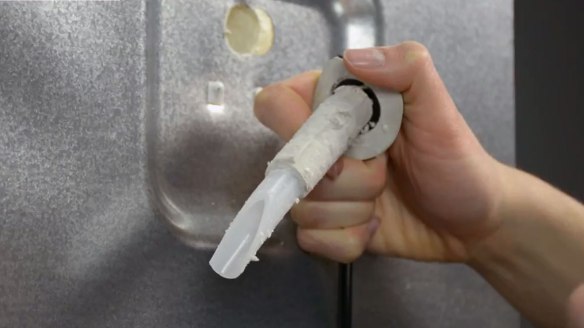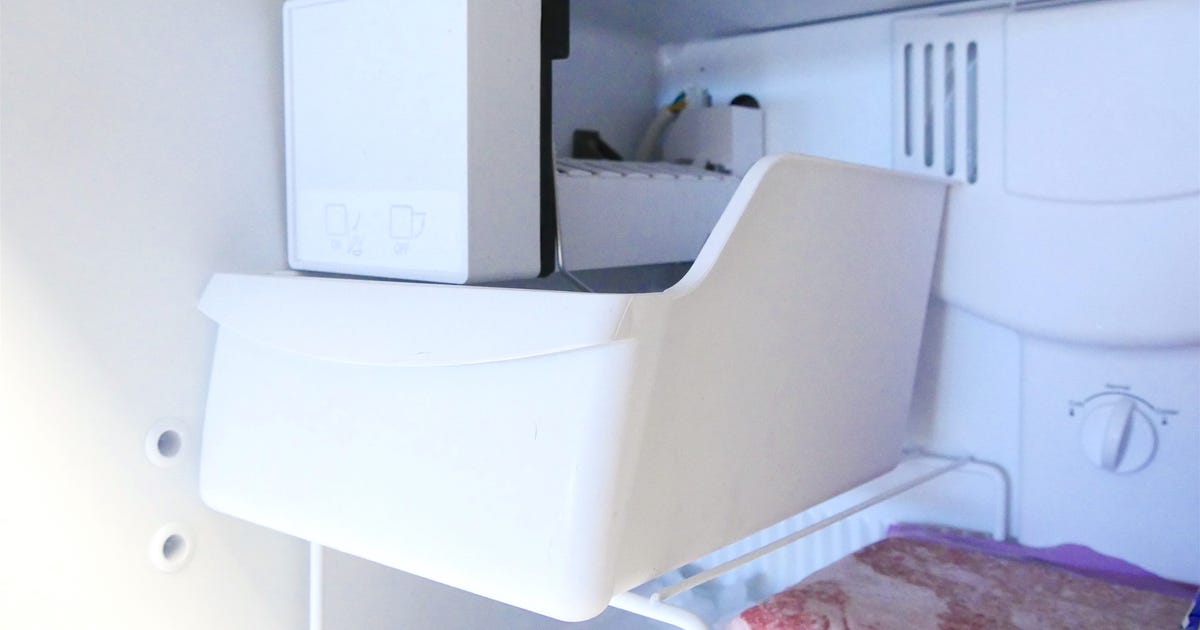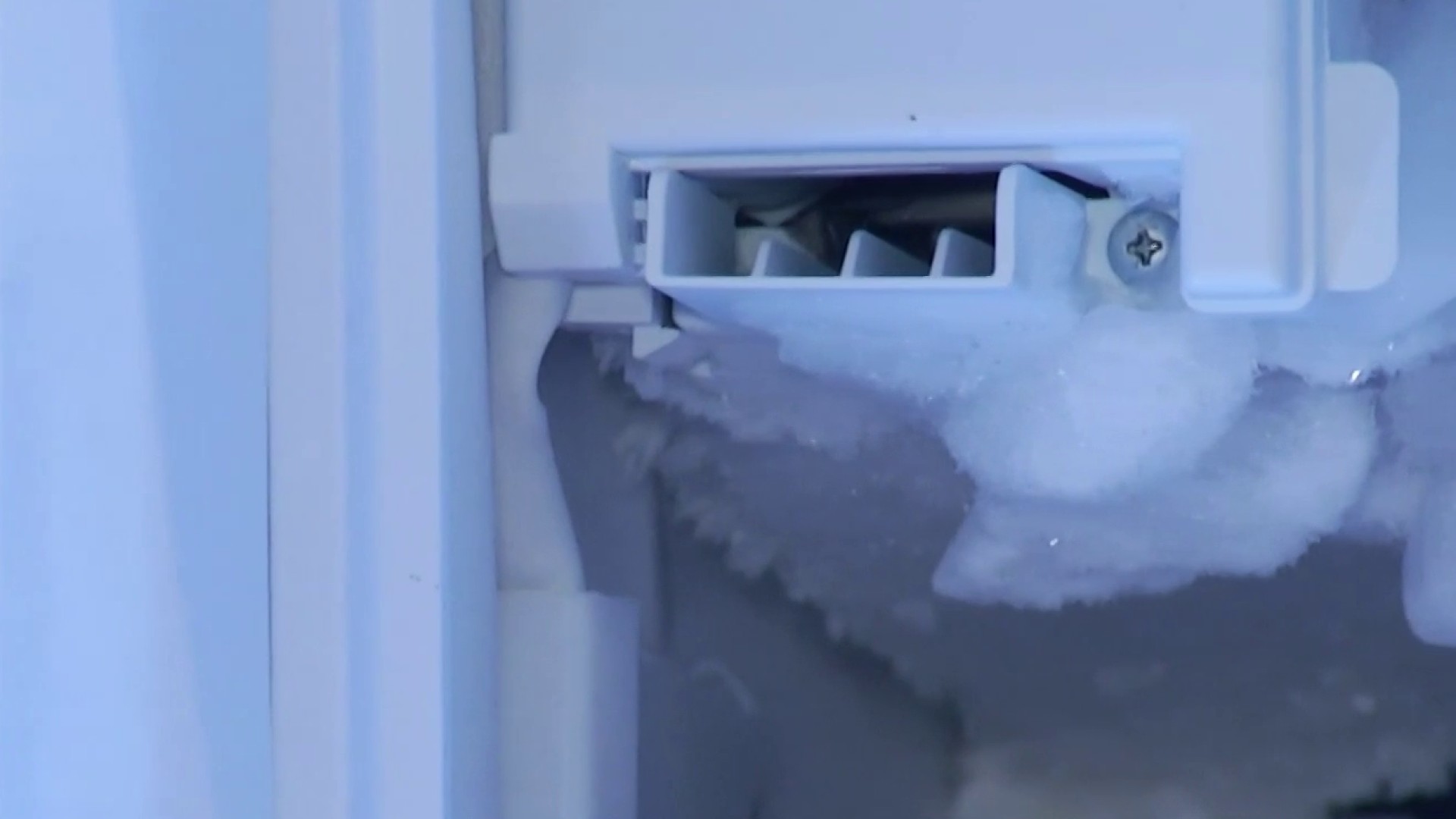Ice-makers are essential kitchen appliances designed to make ice in large amounts. It enables us to stock ice for special events like parties or even daily usage.
However, an ice-maker freeze-up can be pretty costly to repair if it ends up hurting the appliance.
Want to know why your ice maker is freezing up and how to fix it? Read on!
Page Contents (Click Icon To Open/Close)
Ice Maker Keeps Freezing Up? (10 Common Causes & Fixes)
Ice-makers freeze up when the ice is unable to be released from the evaporator plate. Since the water flows uninterrupted, it makes a massive ice block.
Determining a freeze-up is relatively easier than identifying what causes it. Though the causes can be several, here are some common problems to look for:
1. Refrigerator Temperature Is Set Too Low
Here's the thing: if your refrigerator's temperature is set extremely low, chances are it will freeze. That's because low temperature exposes the water inlet tube to freezing conditions.
The result can be a needless inconvenience as water in a water-pump inlet tube should always be liquid to keep it from freezing up.
How To Fix:
To tackle this issue, slightly raise your fridge's temperature and wait for 24 hours. In the meantime, check your manufacturers' instruction manual.
This will tell you the optimum temperature where the ice-maker will function most effectively and efficiently.
2. Scale Build-Up
If you notice any build-up in the ice maker, chances are it's due to hard water. This is because magnesium and calcium join forces and adhere to areas where water runs all the time [1].
If you've lived in a place ever with hard water, then you must have noticed scale building on your tiles as well as around the faucet.
How To Fix:
To avoid scale build-up, you must ensure that your machine gets routine cleaning. Use a phosphate filter or water softener to reduce the scale.
Related Article - How To Remove Hard Water Build-Up

3. Bin Control Malfunctions
Bin controls manage the quantity of ice getting released in the bin for keeping overflow. Once it reaches optimum capacity, it turns off the device.
However, if you've got a bin-control malfunction, the machine will continue making ice even after the bin gets full.
How To Fix:
To tackle this problem, shut down the ice machine manually. Once you do it, call a professional technician to take a look at your device.
4. Water Filter Problem
Typically, if the ice-maker isn't ejecting or making ice, you'll likely suspect it to be a freeze-up problem!
However, this isn't always the case; it can be your machines' water filter as well. This is because a clogged or dirty filter will affect or slow down the quality and quantity of ice your device makes.
How To Fix:
To prevent such issues, make sure to switch water filters in the machine biannually.
5. Frozen/Clogged Water Lines
The water-line provides the ice machine with adequate water. However, if it's too tiny or replete with mineral content, it won't supply the proper flow needed to make ice.
Reduced water flow indicates the device is unable to release ice out of the plate. As a result, deformed icicles are formed. And unfortunately, these freeze up your ice maker eventually.
How To Fix:
To tackle the problem, make sure your water supply lines are properly insulated. Then, call a professional plumber to do this task!
Read Also - Why Is My Ice Maker Leaking?
6. Dead Heating Element
This may sound ironic, but your ice-maker includes a heating component. This heating coil (or heating element) is employed to thaw the surface area of icicles in a tray so that they separate and eject easily.
If the heating coil is dead, chances are the machine will get blocked with ice build-up, and it will be unable to push ice out from the trays.
How To Fix:
Make sure to discuss this problem with the manufacturer, check the warranty coverage status, and afterward, decide whether repairing is worthwhile.
7. Frozen Water Inlet Tubes
Even if the refrigerator has the right temperature, its water inlet pipes can get frosty, stopping the entire unit before it even starts.
How To Fix:
To address this issue, grab your hairdryer and set it on medium-to-low settings. Then, blow hot air on the frozen water inlet pipes till all ice melts.

8. Faulty Electric Eye (Sensor)
Most ice-makers come with electric eye sensors to indicate when the icicle holder is full. In addition, some models have sensors and red-light sources on both sides.
Problems with electric eye sensors can cause disturbance in ice production. In case you're lucky, something might be blocking the eye sensor, probably some ice! However, if the electric sensor itself has an issue, it may cost you dearly.
How To Fix:
The best way to tackle this problem is to get in touch with the appliance's manufacturer or retailer and get it repaired. Try to avail your warranty before you pay someone to repair it, though.
9. Freezer Cooling / Evaporator Coil Problems
The ice-maker water can frost at the wrong spot if the frigid air is circulating near elements that it should not. You want that frosty air to remain firmly inside the cooling coils without escaping.
How To Fix:
To fix frozen coils, check them for cracks, bypasses, holes, or splits. If you find any, clean the area mildly with sandpaper, and remove debris or dirt entirely, especially refrigerant oil.
Make sure you don't push any dirt/debris into the existing holes. And if there are no bare patches to cover, it's time to contact a professional.
10. Float Switch Malfunctions
Float switch assists in managing the quantity of water utilized during the freeze-cycle in ice-makers. If the problem lies with this switch, it can cause the ice-maker to generate bigger icicles than usual.
How To Fix:
Additionally, it can lead to freeze-up as well. In case you find bigger ice, call a skilled technician to examine the overall performance of your unit.

Popular Brands Of Ice Makers Freezing Up: Tips For Fixing
Each manufacturer also deals with this problem differently. Read on as we discuss the more important ones:
Samsung
If your Samsung ice-maker machine freezes up, there is a tried-and-tested way to fix it [2]. Here's how you can do it:
Learn More - How To Defrost Samsung Ice Maker
LG (Refrigerator)
Your LG fridge ice-maker can frost for reasons like defective water filter and water line system, shallow freezer temperature, wrong water pressure, etc.
Here's how you can fix it:
Related Article - How To Reset LG Refrigerator Ice Maker
Frigidaire
If your Frigidaire ice-maker freezes up, it can be due to many reasons, including a broken air damper, defective thermostat, faulty thermistor, etc.
You can quickly fix it by following the tips below:
GE
There are numerous reasons your GE refrigerator ice-maker keeps freezing up. These include a low freezing temperature and water pressure, damaged water filters, defective inlet valves, malfunctioning ice-maker, improperly-placed water line systems, etc.
Here's how you can fix it:
Preventative Maintenance To Keep Ice Makers From Freezing Up
Preventative maintenance is the only key to less downtime, longer life expectancy, and optimum running efficiency of the ice-maker. Not only will it help your appliance from freezing up, but it will save it from various other issues as well.
Here are a few primary preventative maintenance items to consider when trying to keep your ice maker from freezing up in the first place:
Related Article - How To Maintain And Clean Ice Makers

FAQs
How long does it take to defrost an ice maker?
If you're following the 'force' defrost approach to unfreeze the ice maker, it will typically take 20 to 30 minutes to remove the ice. This method doesn't require you to empty your fridge or remove food items.
Does resetting my ice maker unfreeze it?
Yes, resetting your ice-maker will unfreeze it. It's an alternative way to defrost a machine other than the 'force defrost' procedure. To do it, take the ice tray out first. You'll see a red button; push it for 10-15 seconds, and release.
For More Info - How To Reset Ice Maker
Why does my ice freeze together?
Here's the thing: ice in your freezer will soak up heat, which causes it to thaw slightly amid the 'defrost cycle' and might cause it to freeze together. Increasing food load will screen the heat exiting the 'defrost cycle' and keep ice from thawing.
Why isn't my ice maker making enough ice?
If the ice-maker isn't generating enough ice or ice or is making cubes or crescents that are tinier than usual, it indicates that your unit has a clog around the supply line.
Conclusion
Ice-maker machines are essential appliances that make ice at home in large quantities.
However, it can freeze up for numerous reasons, from the faulty inlet valve to frozen water lines to faulty electric eye sensor to extremely low refrigerator temperature. More that can damage your machine, leading to a costly repair.

Ian Haynes is an expert writer who has successfully deployed over 500 plumbing pages and other related content. He has an excellent understanding of home plumbing issues and translates his experiences via Plumbing Lab so readers can have a better understanding of common household problems. Outside of his work, Ian likes exploring Brooklyn with his Labrador.
